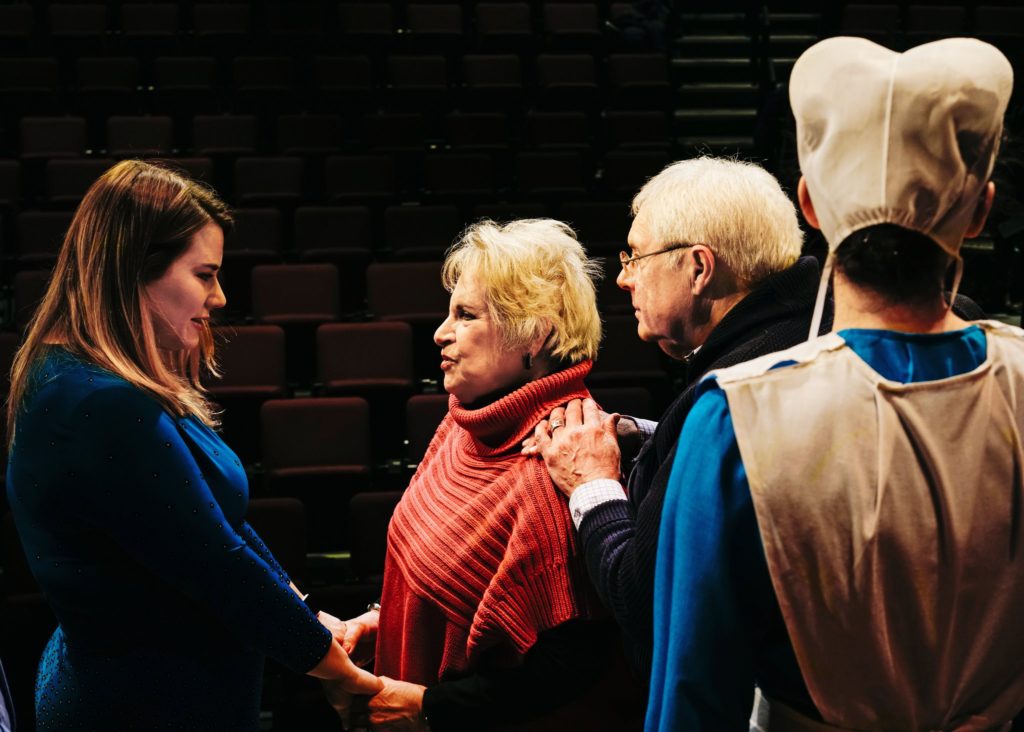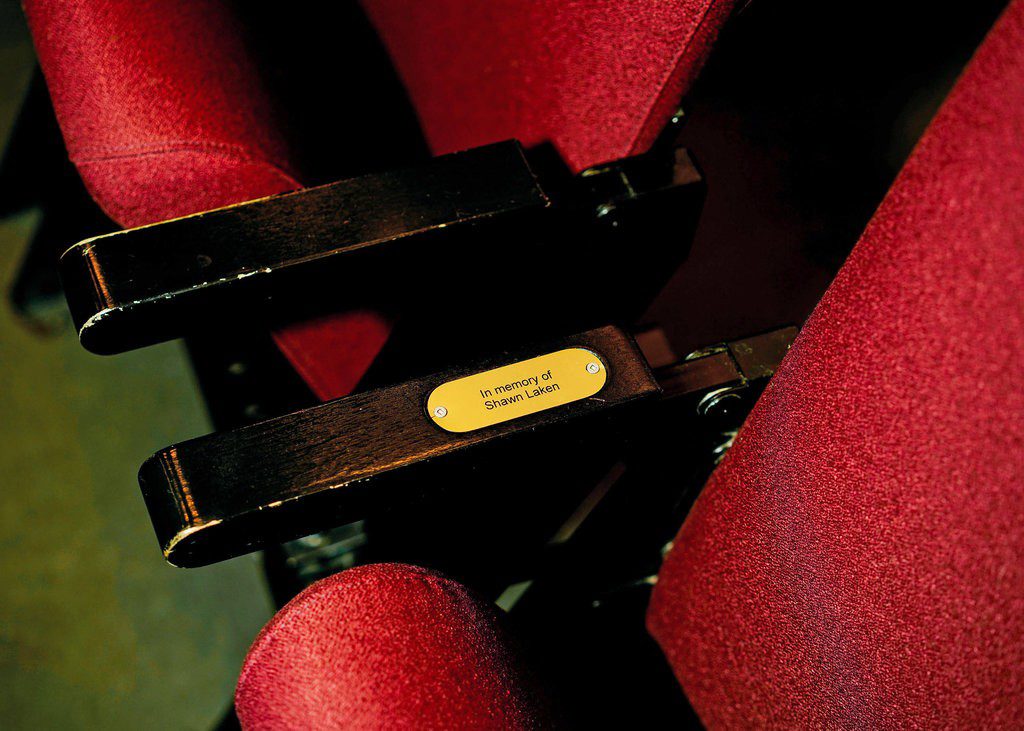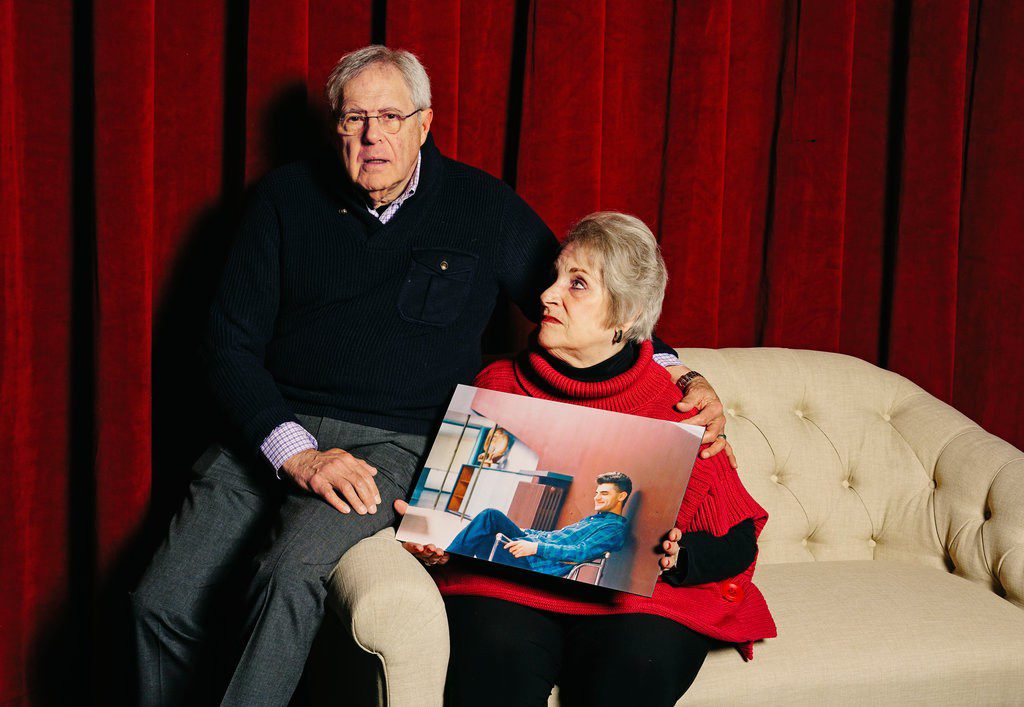by Eric Grode | February 6, 2019

Photo Credit: Justin T. Gellerson for The New York Times
BALTIMORE — The seats are no more than 14 inches from the Everyman Theater stage here. There are two of them, and they each bear the name of Shawn Laken, an aspiring painter and filmmaker who would have turned 50 last year.
Shawn had never set foot in this theater, which is currently presenting “Everything Is Wonderful” Chelsea Marcantel’s bruising story of rage and absolution within an Amish community. He died in 1988 in a car accident on a winding road near Bard College, where he was a junior. He was buried on what would have been his 20th birthday.
Sandy and Mark Laken, Shawn’s parents and the sponsors of this production, have spent a lot of time at Everyman recently. Opening night, Feb. 1, marked their fourth time seeing the play in a week. But a different couple sat in the front-row seats marked “In memory of Shawn Laken” that night. Sandy and Mark had moved a few rows back. They were, both literally and emotionally, too close to the work.
Looking for sponsorship
“Everything is Wonderful” takes place in the aftermath of another car accident, one that kills two children in an Amish family. The father’s impulsive decision to invite the grief-stricken driver into their home dredges up a series of confrontations that test the community’s ability to forgive any and all acts if they are properly repented.
Ms. Marcantel said she came up with the idea for the play, which had its premiere in 2017 at the Contemporary American Theater Festival in Shepherdstown, W.Va., after seeing a Werner Herzog documentary about a fatal car accident involving an Amish buggy.
The subject matter hadn’t occurred to Vincent Lancisi, Everyman’s artistic director, when he was explaining the theater’s finances to members of its board of directors. Like most theaters, Everyman — which has its own repertory company and relocated in 2013 to a converted vaudeville theater in downtown Baltimore’s arts district after an $18 million capital campaign — seeks sponsorship for its productions, typically to the tune of $10,000. And this year’s offerings by the likes of Oscar Wilde and Brian Friel had already found takers.
The only sponsor-free play left was “Everything Is Wonderful,” and when Mr. Lancisi mentioned that it was a drama about forgiveness within an Amish community after a tragedy, Sandy — a new board member — raised her hand and said, “Oh, we’ll do that.”
Minutes later, however, Mr. Lancisi remembered a conversation he had had with her a year or so before, where she had mentioned the death of her younger son. “So I called Sandy and said, ‘Listen, you should know a bit more about this show.’”

Photo Credit: Justin T. Gellerson for The New York Times
She and Mark asked to read a copy of the script. Shortly thereafter, they called Mr. Lancisi back and said they were still in. “It was a no-brainer,” Sandy said.
‘It has changed our lives’
Their involvement with “Everything Is Wonderful” has also spurred the Lakens — who have met with and counseled many other grieving parents in the decades since Shawn’s death — to take on another project. In response to the play’s message of forgiveness and reconciliation, Sandy and Mark are searching for the man who they feel is responsible.
The details as to who this man might be are murky. The police record for that September night is gone, and more than three decades have blunted the memories of many involved. Everyone agrees that Shawn was driving a friend home that night on River Road. Everyone agrees that he swerved, crashed into a tree and died instantly.
The Lakens’ telling of that night includes two other cars. One was right behind Shawn, and its driver saw the accident. The other was coming the opposite way on the two-lane road, driving in a way that forced Shawn off the road.
Two Bard officials who were working there at the time — Leon Botstein, the school’s president, and Mark Primoff, its associate vice president of communications — remember this purely as a one-car accident. As it happens, Mr. Botstein had lost his own young daughterin a hit-and-run incident several years earlier, and both he and the Lakens recall this tragic coincidence as being helpful in the aftermath of Shawn’s death.
As the Lakens recall it, though, the driver of this other car — who was not a Bard student — surfaced a few days later. And they say Mr. Botstein offered them the opportunity to meet with him.
“We were so grief-struck and shocked that we chose not to,” Sandy said. “Had we had more wisdom at the time, we would have.”
Why? “To tell him that we forgive him,” she said. “This play has taught me that.”
Neither of the two Bard officials can recall the possibility of such a meeting. “Nobody here is disputing anything that the Lakens said, because we have no reason to,” Mr. Primoff said. “But we have not been able to supply the details that would help give them the closure they want. And we have looked extensively.”
For his part, Mr. Botstein — who declined to press charges after his daughter was killed — speaks from experience about the harrowing questions that he and the Lakens and every other person in their situation ask themselves.
“For every parent who loses a child, it’s very hard not to feel some responsibility. There’s always the counterfactual of ‘If only I had. …’ You personalize it.”Mark and Sandy Laken holding a photograph of their son, Shawn Laken, at the theater.CreditJustin T. Gellerson for The New York Times

Photo credit: Justin T. Gellerson for The New York Times
In the wake of the emotions surfaced by “Everything Is Wonderful,” the Lakens have reached out to the passenger in Shawn’s car, who suffered only minor injuries, as well as the driver of the car behind them, in the hopes of finding threads that might lead them to this other driver. They have also asked Bard and the Dutchess County, N.Y., police department to assist in their search.
Regardless of what they learn, Sandy said, “We know it was meant for us to be involved with this play. It has changed our lives.”
Mark is less effusive than his wife, but he echoed the power of this work. “People who see this play will start to think about forgiving others,” he said.
A reason to write plays
The night before “Everything Is Wonderful” opened, the Lakens met Ms. Marcantel for the first time and discussed their personal connection to it. She described this set of circumstances as something close to a miracle.
“You get a lot of signals from the universe that you should stop doing theater, that it doesn’t matter,” she said. “So it’s nice to get a thumbs-up from the universe like this.
Mr. Lancisi said the Lakens had attended various rehearsals of “Everything Is Wonderful” but originally planned to save their first viewing until opening night. “She didn’t want to see it for the longest time,” he said of Sandy. “She read it. She researched the hell out of it. But once we realized the emotional power of this play — for anyone, not just the Lakens — I said to my staff, ‘She’s got to come earlier. Otherwise she will melt on opening night.’”
So the Lakens came to the first preview. And again two nights later. And a third time.
In the process, they initiated a discussion that was severed 31 years earlier. “Once a child dies, there’s no subsequent conversation you can have with that child,” Mr. Botstein said. “That may be the hardest part.”
And so the Lakens wish instead to speak with another person, one who they believe was responsible for Shawn’s death. “I just want to say to him, ‘Tell me what happened,’” Mark said.
While that question lingers — not yet known, possibly unknowable — Sandy and Mark hold hands in the dark night after night, watching six performers tell an eerily similar story with a bittersweet resolution that has eluded them.
They cry each time at the ending, as do many others in the audience. And the distance between art and life, between 1988 and 2019, between themselves and Shawn, collapses.






